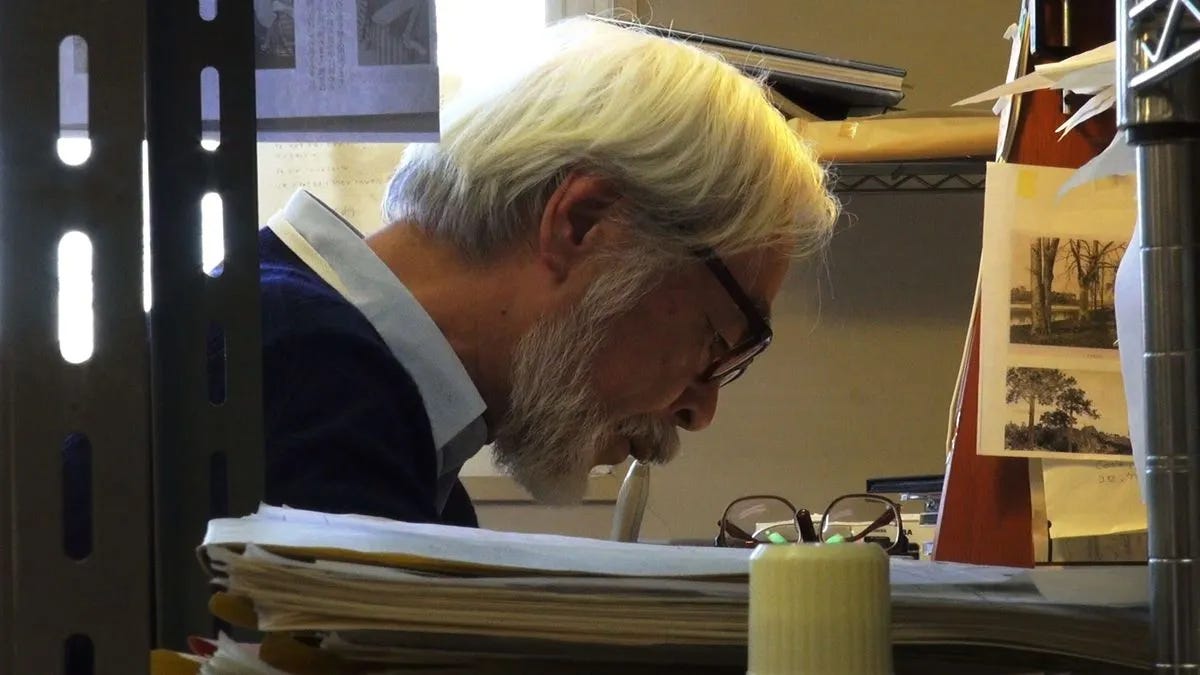Hayao Miyazaki: Falling in Love with the Process and the Unglamorous Side of Productivity
From the Kingdom of Dreams and Madness (2013) via Polygon.
The old man arrives at his private studio at 10 am in the same car he’s owned since the 60s. As he steps into the empty building, he opens the curtains and greets “the residents”. Although you can’t see anyone, he’s confident there’s someone there. Soon after, he makes himself a cup of pour-over coffee and with the help of an assistant, he moves a bench to a designated spot outside the studio. A small sign on the bench reads “Have a seat”. He’ll be able to see anyone who accepts his offer from the comfort of his office. Finally, he hunches over a small desk and draws for hours. Miyazaki throws away anything he’s not happy with and chain-smokes.
Although I like to call myself a fan of Studio Ghibli, I think I’ve watched more documentaries about the studio than actual movies. So if anything, I’m a fan of Hayao Miyazaki. Hayao Miyazaki is an imposing figure. Among other feature films, the legendary Japanese filmmaker and founder of Studio Ghibli has worked on beloved animated movies, such as My Neighbour Totoro, Princess Mononoke, Spirited Away, and The Boy on the Heron. For those unfamiliar, Miyazaki is notorious for announcing his retirement, only to return and work on his next film soon after.
Based on the routine I described in the opening paragraph, which I took from the documentary 10 Years with Hayao Miyazaki, I wouldn’t call this routine healthy (Miyazaki chain-smokes, after all). Still, I decided to write about it for some reasons. First, the creative process is a non-linear and frustrating one. Although there are some aspects we can control (such as arriving at the office at the same time every day or making ourselves a cup of coffee), there are many messy and inconsistent parts of our creative routine. Second, while some describe Miyazaki as a loving figure, you soon discover some of his flaws. He admits being an absent father, he’s irritable, and he’s hard to deal with at times. You can even see signs at Studio Ghibli encouraging anyone who doesn’t like the job to quit. However, an incredible optimism permeates his films, the company that made them to be anything but.
That’s not to suggest that everything about movie-making is unbearable. If there’s something that these documentaries articulate well, it is the love of the process. Many documentaries shy away from showing the process because it can be boring and repetitive, but there’s a counterargument to be made here too. The process is boring and repetitive, but’s also intimate and quiet.
There’s something almost magical about seeing Miyazaki trace lines on a white sheet of paper. Watching him work puts me in a meditative trance as if I were part of it as well. Following the erratic tip of the pencil lulls me into a state of flow. It brings me back to when I discovered pen and paper for the first time and the limitless possibility those two items entailed. You could see an activity like drawing as tedious or you can see it as intimate. Like most things in life, it’s just a matter of perspective.
There’s something else at work here. We tend to romanticize people like Miyazaki as lone geniuses born with a gift. When we encounter someone talented, we like to turn them into godlike figures and we assume we could never achieve such a status. That’s a convenient way to look at a situation when you have incomplete information. This is often what happens when you see the finished product without context as to how it was made. But when you know how creative work works, this illusion is soon demystified.
Miyazaki has spent countless hours drawing. As you watch the documentary, you get the sense that this is only a glimpse of his life. There’s nothing glamorous about doing something repeatedly for hours on end. It’s humbling because you’re forced to confront your limitations constantly and that dreadful feeling that you’re not good enough. You’re not born with it, you hone your craft and work on it for decades. That’s how you get good at something. You surrender to the process and ignore the voice telling you you’re not good enough. Even if the voice wins sometimes and there’s an overflowing bin by your side.
Further Resources
The Kingdom of Dreams and Madness (2016)
Never-Ending Man: Hayao Miyazaki (2016)
Here’s a link to my website where I share chapter-by-chapter summaries of non-fiction books.





